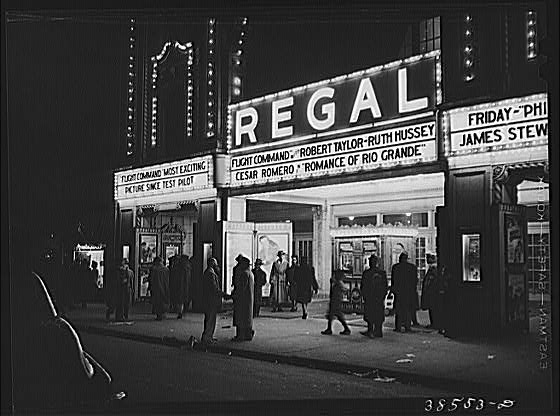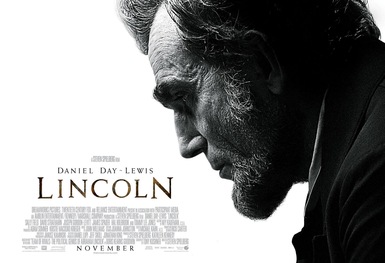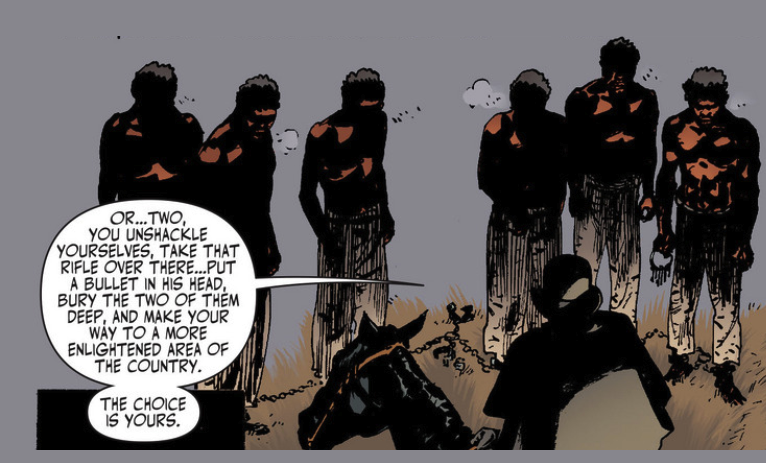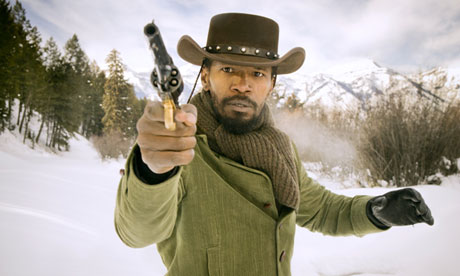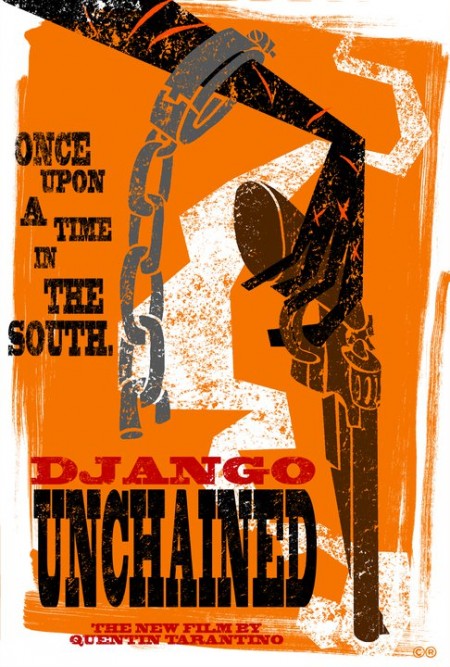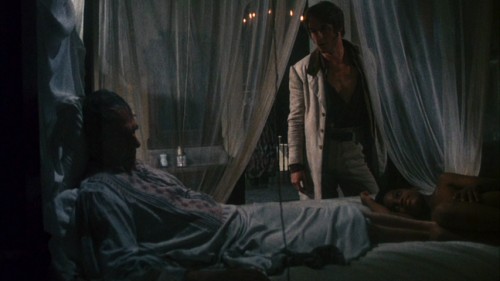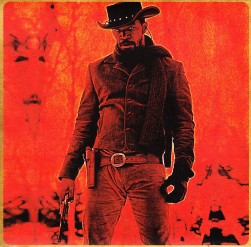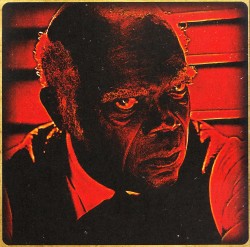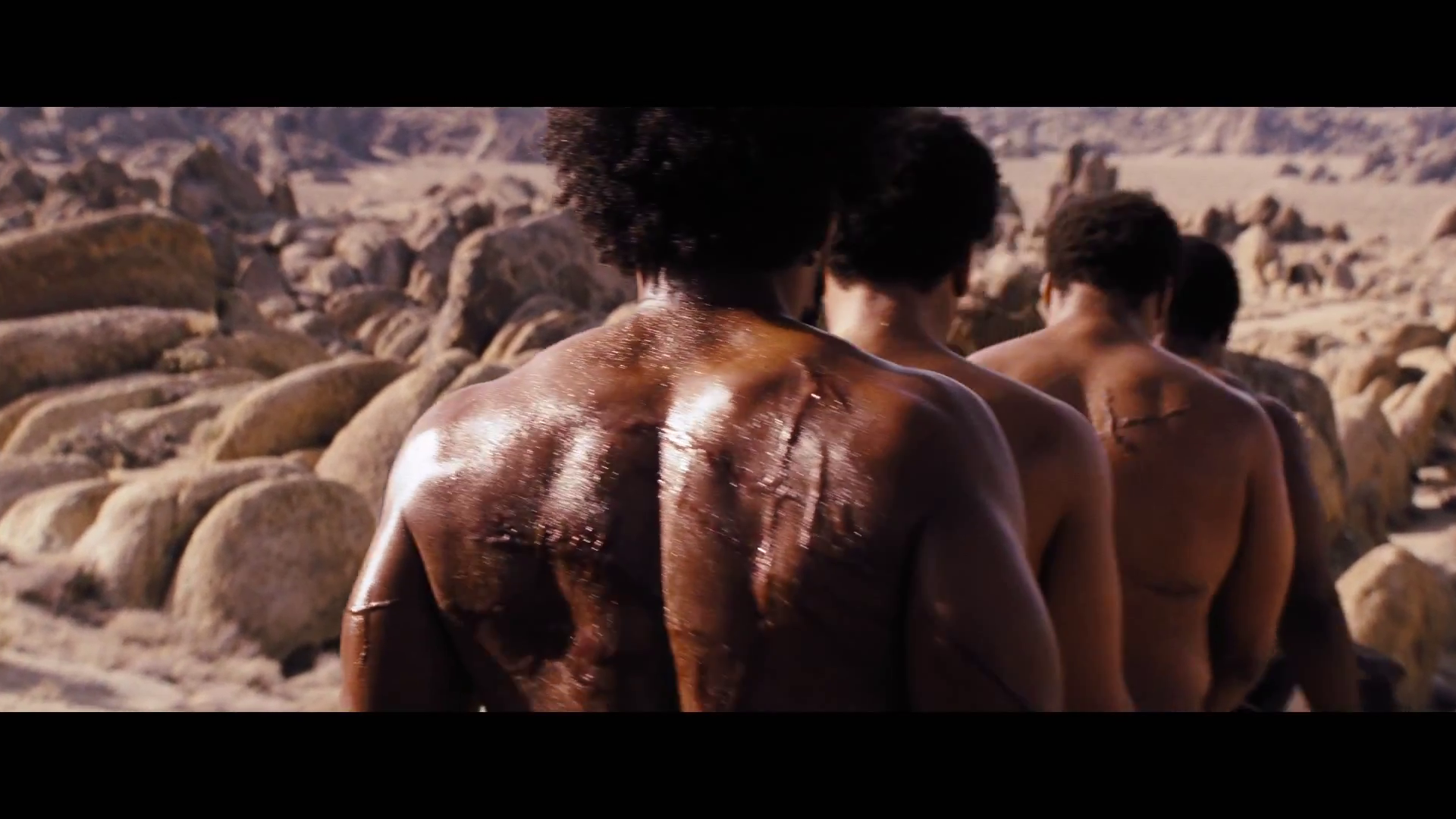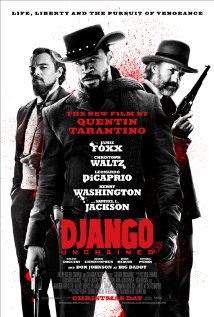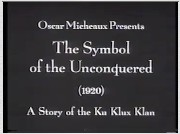Coming in at the tail end of the Django Unchained roundtable, it transpires that I’ve already shared a lot of my thoughts about Django in comments. In this post, then, I’ll mainly be expanding on those ideas + quoting excessively from David Graeber’s doorstop work of economic anthropology, Debt: The First 5,000 Years.
First, I want bring up some ideas about slavery, morality, and legal systems that Graeber talks about and that I think Tarantino illustrates in Django in a smart way. In Debt, Graeber starts by looking at what he calls “human economies” – that is, economies where people are the main unit of account, and money is only used to smooth over social relationships. In these societies, “social currency” was used for weddings and funerals, to settle disputes, and to acquire wives. However, even in societies that recognized slavery and brideprice, this money was not actually used to buy people. And certainly, the same money that was part and parcel of deals between people was not also used to buy things. Graeber argues that two factors enable chattel slavery, a system in which people are equated with things: one, the removal of the slave-to-be from “the web of mutual obligations” that defines him as a human being. And two, violence.
Already, this is looking like a promising lens for the analysis of a Tarantino movie!
In Graeber’s account of traditional societies, slaves are people who have been removed from their context, so that they no longer have mothers, fathers, siblings, and so on to protect them. Only after this removal has been accomplished can they be bought, sold, or killed, because this is when “the only relation they had was to their owners”.
Looking at things this way, the logic of Samuel Jackson’s character Stephen becomes clear. As Noah pointed out, he really doesn’t have anyone else besides Candi. While Noah saw this de-contextualization as a weakness of the character – what real person doesn’t have relatives? – I think it’s an important point. Stephen is an edge case that shows the way the system works more clearly.
It’s pretty clear in Django that slavery is a dehumanizing institution that actively seeks to prevent slaves from forming connections to each other. Think about the extraordinary force used to separate Django and his wife Hilde: when it’s discovered that they have run away together, they are beaten and sold separately. Hilde is then additionally punished by being branded, which forces her out of the role of the house slave and into the role of comfort girl, a prostitute for every low-level foreman and fighting slave on the estate. Forget about marriage: for the sin of calling herself a married woman, Hilde is to be denied even the right to choose her own sexual partners.
Schultz’ actions in the movie take on even more meaning against this background of depersonalization. As the new owner of Django, Schultz is lenient and tolerant, allowing Django to choose his own dress, to exact his own revenge, and to carry a gun. However, all these are acts of charity as long as Schultz owns Django in the eyes of the law. The movie completely understands this point, because what does Schultz do as soon as he frees Django? He offers him a deal: Django’s help over the winter in exchange for Schultz’ help rescuing Hilde. This offer is symbolically important because as long as Django is a slave, he has no power to agree to deals. That’s because only people can make deals, and Django, as a slave, is not a person. By offering Django a deal, Schultz is acknowledging that he is a person and not a thing; in some sense he is acknowledging that the two of them, as fellow human beings, are in some way equals before God.
So that’s kinship networks and personhood. What about violence? Graeber observes that most of us don’t like to think about violence. Tarantino, clearly, is an exception: his work is largely an exploration of the charisma of violence, of individuals with personal charisma (who are almost invariably violent), and of the power of filmic violence to evoke a visceral response in the audience. Think about that however you like; but if Tarantino is going to work through the power and appeal of violence, one of the best “good” uses for his skills as a filmmaker is in an exploration of a society in which violence plays a crucial, obvious role.
To remove people from their networks of mutual obligation requires enormous force. They have to be taken as prisoners of war, or forcibly abducted, or sentenced to punishment for a crime, or sold by someone who has the “right” to be so under what are frequently desperate circumstances. After sale, they have to be transported somewhere else. According to Graeber, a common theme of the laws (Islamic and Roman) of the period is that people become slaves in situations in which they otherwise would have died. They are, in some sense, living dead.
Furthermore, once African people have been forcibly ripped from their contexts and transported to the New World, a system of enormous violence is required to keep them as slaves. This is the violence Tarantino shows directed against black slaves as a matter of course in Django – the brutal beatings given to runaways, the sadistic punishments by foremen, the laws prohibiting black men from riding horses, and the mobs that form to uphold those laws – in contrast to the more cathartic or cartoon violence he shows directed against the people upholding the slave system.
Schultz’ introduction to the audience takes on another meaning when examined in this way. It establishes a kind of moral rightness to the character that would not have been present if he had simply bought Django at the market. Of course, Schultz could have done this: he could have followed the slave-trader brothers until they arrived at their destination and then purchased Django in front of witnesses. He could even have killed them afterward. But wouldn’t we have resented him if he did it that way? He would have been involved in the whole dirty business of buying and selling slaves. Instead, Schultz goes back to first principles and takes a war captive. We can understand the logic of a man of honor who saves someone who otherwise would have died (if only from his own gun).
Concepts of honor and violence are, of course, entwined. On the one hand, violent men are invariably obsessed with honor. On the other hand, honor is “something that exists in the eyes of others. To be able to recover it… a slave must necessarily adopt the rules and standards of the society that surrounds him, and this means that, in practice at least, he cannot absolutely reject the institutions that deprived him of his honor in the first place” (emphasis mine). Graeber is speaking about The Interesting Narrative of the Life of Oladudah Equiano: or, Gustavas Vassa, the African, here, by the way – probably the inspiration for MT Anderson’s great YA novel series The Astonishing Life of Octavian Nothing.
Tarantino, while perhaps not obsessed with ideas of patriarchal honor having to do with control over women, is obsessed with “cool” – with the personal honor codes of violent people. He’s put in a tricky situation in this movie, where he needs his protagonists to be cool and honorable, but is shooting an historical movie at a time when they could not, in practice, both reject the system and remain honorably within it. “In practice” becomes the key phrase, here. Because Quentin Tarantino is filming a movie and not directing an historical event, he has other value systems besides the society his characters operate in at his disposal.
Django and Schultz don’t need society’s approval because they have their own audience. Sometimes their audience exists within the movie: when Schultz frees the slaves in the woods, he has an audience of surprised and shocked black men; when Django turns the tables on the slavers bringing him to the mines, he has an audience of black men in the transport wagon; at the final shootout at the mansion, all the house slaves are on hand. Just as important as the on-screen audience is, however, of course, the audience in the movie theater.
This is a crucial point. It’s important in a Tarantino movie for the audience to side with the “heroes” on screen, however questionable, and to cheer at the end. He uses filmmaker’s tricks to achieve that end – makes the heroes competent and the villains incompetent or crazy, uses close-up reaction shots, slowly escalates the violence. They are tricks, but they are fairly transparent tricks. There’s very little in the way of misdirection: it’s not as if the audience does not realize that they are being led to think a certain way.
And anyway, is this identification automatic, even for an audience in the 21st century confronted with a major star like Jamie Foxx in an obviously heroic role – as both a Western and a Blaxploitation hero? I don’t think this hurdle is at all easy for some members of the audience. I remember having trouble with Kevin Boyle’s historical novel Arc of Justice, about racial violence in Detroit, an obsessively footnoted work of historical fiction that is not even fictional. The moment of realization – oh, if I just identify with the clear victims in this situation, I can forget about trying to justify the unjustifiable – was a huge relief, and I remember it vividly. While hopefully everyone has either had, or never had to have, that moment, I can’t fault Tarantino for taking so much care to keep his entire audience on board.
Anyway, is it a sin for a movie to be a movie? I know this is a sticking point for lots of people – the unsettling collision between historic violence and genre tropes – but personally I find it to be a strength. Or, quoting myself again: “In Django, it’s not just violence per se that’s the subject, but depictions of violence, or filmic violence. Filmic violence can be funnier than real violence, but because it’s funny, it can also be more affecting – you remember the unpleasant things along with the funny things instead of throwing the whole movie out of your brain the second it’s over (because, no matter how much you want to be a Good and Serious person, it’s too upsetting to keep thinking about).”
But getting back to honor: the ability to strip others of their dignity becomes, for the master, the foundation of his honor. Those with “surplus dignity” surround themselves with slaves not out of any kind of economic necessity, but for reasons of status. DiCaprio’s Southern gentlemen is exactly one such man of honor. I think his character is a great subversion of previous portrayals of “Southern gentlemen” like Clark Gable’s Rhett Butler in Gone With the Wind. It’s not that some bad apples ruined the system for the respectable plantation owners, Tarantino is saying. Rather, it’s that those who are the most entrenched within the system, and the most active in upholding its abuses, are, by the logic of the system, the most respectable. In other words, Candi is what a respectable southern gentlemen looks like: a sadist surrounded by “things” (people) over which he has ultimate power, who stages displays of that power for his own glorification; but who is however unnaturally obsessed with the virtue of his (full-blood white) relation.
It’s exactly Candi’s status as one of these “surplus dignity” owners which requires Schultz and Django’s elaborate deception (in addition to other, character based explanations). Calvin Candi is rich and masterful. He doesn’t need the extra $300 for Hilde.
So far all of this might seem a little basic, or simplistic, even. Everything I have discussed has been theoretical, with little in the way of nuanced psychology or a complex moral worldview. This is not to say that there is no complexity in Django. For me, personally though, the strength of the movie lies in the way that these conceptual points about what it means to be enslaved – about what a slave society must be like – are presented without explicit comment, in the way the characters relate to each other and in the events shown on screen – in wordless reaction shots, rather than in speeches.
One final theoretical note, then, to close out the post. Graber discusses how “freedom” as a concept developed alongside slavery; as well as how personal (Roman) property law developed in response to people-as-things. The concept of freedom, the ability to do whatever you want with yourself (except for the things you can’t do), follows on from the concept of slavery, the ability to do whatever you like with your human property. Here’s the quote:
“Freedom is the natural faculty to do whatever one wishes that is not prevented by force or law. Slavery is an institution according to the law of nations whereby one person becomes the absolute private property of another, contrary to nature.”
Contrary to nature! You gotta love details like this. Theories of phrenology espoused by Calvin Candi, the whole (once)science of racial inferiority, clearly must have developed to fix this otherwise beautiful theoretical framing.
It does point toward an important question, though. If the main distinguishing feature of freedom is that one is not a slave, what does it mean to “own” yourself and to “own” your freedom? How can the same person be both the master, and the slave?
According to Graeber, it’s this question that necessitates the division of the self into two selves: a mind which “owns” the body, over which it has absolute power. It’s a division Tarantino supports in his movie, to an extent. Put simply, it’s a big problem for Tarantino that he only has one hero in his movie. What is he saying about all the other black bodies – that lacking Django’s luck and skill with a gun, they simply accepted their fate?
Here, again, the reaction shots are important. The reaction of Schultz, the bartender, the saloon mistress, to two black brothers made to fight to the death is hate and disgust (and queasiness, in Schultz’ case). The reaction of Candi’s other slaves to Django, a free black slaver, is hate and disgust (and confusion, on the part of the head maid). The reaction of Stephen, on the other hand, to the sight of a free black man on a horse, is hate… and resentment.
It’s been mentioned before that Stephen is the movie’s final villain because he is Django’s doppelganger. They contrast each other in nearly every way: Django fights for his connection with his wife, while Stephen’s only connection is with his master; Django is young and fit, while Stephen is old and has a bad leg; Foxx plays Django with restrained dignity while Jackson plays Stephen as loud comic relief. At the same time, though, they are bound together: first as the two largest black roles, played by the two biggest black stars. But secondly, because they are both given these closeups where they show the “wrong” reaction, even if Foxx’s Django is playing a role at the time.
It’s that moment of doubt, as well as all the other indignities up until that point, that forces the movie’s explosive conclusion. Of course, Django has to strike against the entire system, because the entire system is responsible for what he and every other enslaved person has suffered. But also, this is a scene of putting right: the better ending than the one where he pretended, even for a moment, that he liked or was indifferent to what he’d seen.
We can’t always act, the movie says. But we can always wish, fantasize, about the way we would like to act. When we are able to counteract the violence and indifference of the unjust society we live in, and bring about a reality that accords with our wishes, we are heroes. But even when we are not able to change anything about our external reality, the simple act of wishing and fantasizing itself has power.


